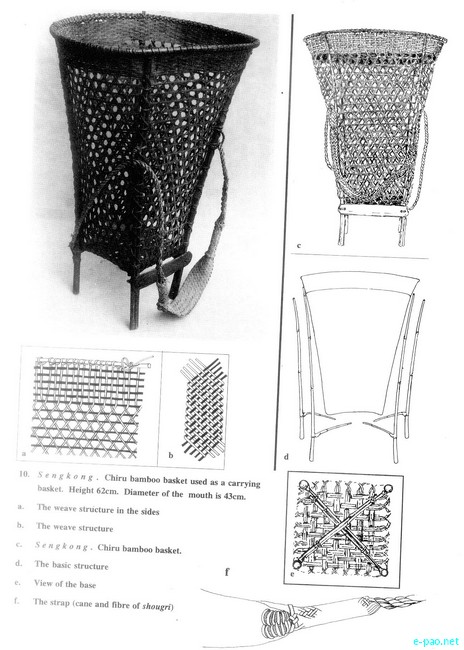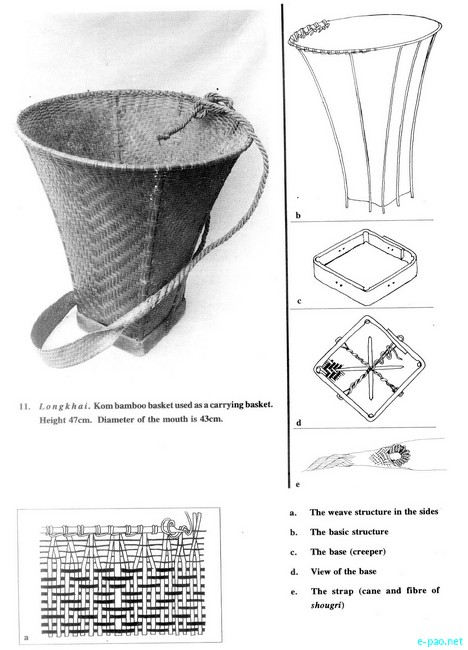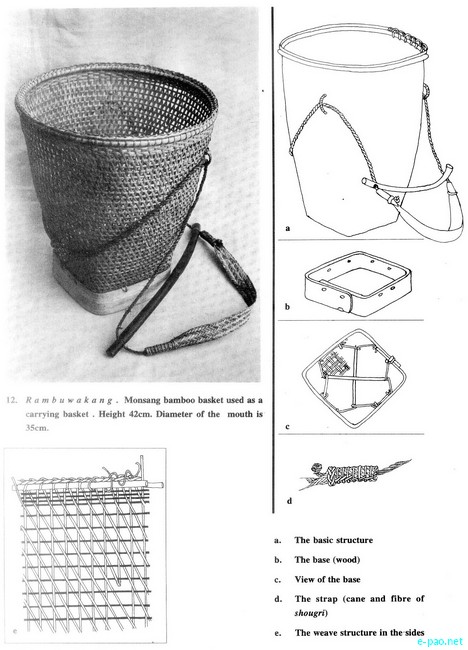Cane and Bamboo Crafts of Manipur
- Part 3-
By: Mutua Bahadur *

PREPARATION & TECHNIQUE
The craftsmen cut up bamboo poles into several pieces horizontally and/or vertically according to the job requirements. Bamboo required for house construction are split horizontally into two, starting from the base. The split halves are again split into two, thus dividing the whole bamboo into four bamboo splits. Each of these four bamboo splits is termed a Wachet. While the wachets are still wet', the gluey layer on the inner surface is knifed off starting from the base. The protruding parts on the nodes, especially the Wamit or 'eye' of the bamboo, are removed before use.
The craftsmen employ an ingenious technique also to split a bamboo pole into four uniformly at a stroke. Two bamboo posts, each about a meter high and of the same size as that of the bamboo to be split, are erected. The next procedure is to position wachets, criss-crossed at desired angles aimed to split the bamboo pole accordingly, and bind them to the two standing posts with fine bamboo splits. The tip of the bamboo pole is split open into four proportionate sections; just wide enough for inserting into the appropriately positioned wachets.
The bamboo pole is then thrust forward against the wachets, at the same time splitting the pole into four with the hand. It does not require much effort in splitting a bamboo by such method. The stocky base, which usually offers slight resistance, is lifted up by a second person and then thrust hard against the wachets to split it. This ingenious technique takes less time and offers a more efficient job than the usual method of splitting bamboo with machetes.

The craftsman requiring bamboo for making baskets cuts up whole bamboo poles into several pieces, usually about a metre long, according to the necessary requirements. The cut pieces are then split vertically into two. The split halves are again split vertically into two - thus forming wachets. Thereafter, the gluey layer on the inner surface is removed. While the bamboo is still 'wet', the hard outer layer or skin is removed by scrapping with the Thangjou (Machete). The protruding parts on the nodes are also removed. The wachet is split vertically into two. The split halves of the wachet are again split vertically into two. Each of the four bamboo splits thus formed are referred to as Hanggel Tao.
Again the Hanggel Tao is split vertically into two. The split halves are further split into two to form Payashis. Each of the four Payashis is then finely knifed uniformly; after which they are referred to simply as Paya. The payas are directly utilised for making baskets, or, as in some cases, they are stored up on the Lup for some period so as to condition them from getting spoiled by Stem Borers. The conditioned payas are mainly used for making baskets in the close weave pattern. These baskets are usually spongy in nature.
Besides the paya, there is another variety of fine bamboo split known as Kanam Paya. In the case of paya, the hard outer layer is removed. For the kanam paya however, it is left untouched. According to the purpose of use, so much of the inner layer of the kanam paya is removed as found necessary. The kanam paya is used in making varied baskets woven in the pattern of diagonals filled into the texture of the open hexagonal weave. It provides a strengthening support to the baskets. Naturally enough, the baskets woven with kanam paya are usually stiff and strong.
Small Pajengs or fine bamboo 'sticks' are chopped off vertically from a Hanggel Tao, and are used in making fish-traps such as the Taothum, Kabo-lu, etc. And, for making fish-traps such as the Taijep, Soralu, etc., the Hanggel Tao is split horizontally into several pieces. The split pieces are scraped with thangjous to make them cylindrical in form, and are then used in making the traps. The split pieces in cylindrical forms are termed as Lushit.
The Maring tribals use a box with lid called Pongsang lapak made from the pulpy layer of the bamboo. To make this type of box, the Marings cut up the bamboo into several pieces. The hard outer layer is sliced off bit by bit with a thangjou until the pulpy layer within is left wholly exposed. The next process is to apply the juice of Khrat (a poisonous plant used by the Marings) thoroughly all over the outer surface of the naked bamboo, and it is heated over the fire.
This is done to prevent this softer layer of the bamboo from breaking when folded. After being properly exposed to fire, the bamboo piece is split vertically into two. The curved split pieces are then straightened out. The final procedure is to fold the straightened split pieces into oval-shaped structures which form the framework of the box. The lid and the body of the box are similar in shape, with the body slightly smaller than the lid in size.
The techniques employed in making baskets, which are currently in use in Manipur, fall into two broad categories: Firstly, to weave the payas in the pattern of crossed-diagonals. The weave is started and finished on the length of the same paya, i.e. the paya with which the weave was initially started is utilised till the weave completes. The other technique is to weave the payas vertically as a first step, and then to weave horizontally as a second step. The second set of payas are interwoven between the vertically woven payas.
The baskets that are woven by employing the first technique have weaves that are quite flexible and that can be stretched up or down as desired. For this reason, this particular technique is specially utilised for making baskets with lids. Sometimes, too, skilled craftsmen make limited number of Carrying Baskets and Container Baskets in this pattern of weave. The second weaving technique is mainly employed in making Container Baskets, Carrying Baskets, Storage-Baskets (in Double Weave), etc. To strengthen the base (of all varieties of baskets), two sticks are placed in crossed-diagonals on the base, with the tip of the sticks hidden into the weave.

To ensure that the tip of the sticks do not come loose, they are tightly bound in various ways with cane splits. Baskets with lids are also provided with such criss-crossed sticks on both the base and the lid. Here, too, the tip of the sticks are hidden into the weave and are tightly bound with cane splits. Both the base and the lid of some of the baskets that are used by the Tangkhuls have additional sticks arranged on the rim, usually four sticks forming a square rim. This is in addition to the basic two sticks placed in crossed-diagonals. The sticks are meant to strengthen the structure. In the case of baskets with lids, the rim of the lid is strengthened with an additional weave which is actually a flap of the main weave.
At the time of making the baskets, the craftsmen use a particular implement called Sanggai. It is a carving knife having a long bamboo handle with a short, sharp-edged but slightly curved blade. It is more commonly used in the valley. It is also used in some areas of the hilly regions. But, people in the hills generally use the thangjou for the work. Another implement which the craftsmen use is a small iron rod with a sharp-pointed tip. This is used for tying or binding cane splits to the baskets whenever required.
The binding material used in the construction of houses and for other purposes is usually the paya obtained from the Watangkhoi bamboo (Bambusa vulgaris). For weaving baskets, the paya obtained from the Unan bamboo (Dendrocalamus strictus) is used. Paya of the Utang bamboo is used in weaving open-weave baskets like the Polang, and also for making Yangkok.
In the hills the Uei (Dendrocalamus sericeous) and the Unap bamboo are used for making close-weave baskets like the Thumok. And in the valley, the Saneibi (Bambusa balcoa) are used as pillars in houses. For roof supports, the Longnga bamboo (Dendrocalamus flagellifer) is normally used. The Hoomdaang or Lower Roof Support is done with the Khok bamboo (Bambusa khasiana). The wachet or bamboo split used as the basic structure for the walls is obtained from the Moubi (Melocanna bambusoides) and the Khok bamboo.
The Hanggel or bamboo rods used in the fishing nets are generally made from the Longnga and the Saneibi bamboo respectively. The handles for spears are made from the Utang bamboo. For bows and arrows, the Lirung or bow is made from the Tenwa bamboo (Arundinaria callosa) and the Tenjei or arrows are made from the Khok bamboo. The implements for looms are made from the Nat bamboo (Teinostachyum wightii).
See a gallery photo of Cane and Bamboo Crafts of Manipur here.
To be continued ....
|
* Mutua Bahadur contributes to e-pao.net regularly. This article was webcasted on August 04, 2011.
* Comments posted by users in this discussion thread and other parts of this site are opinions of the individuals posting them (whose user ID is displayed alongside) and not the views of e-pao.net. We strongly recommend that users exercise responsibility, sensitivity and caution over language while writing your opinions which will be seen and read by other users. Please read a complete Guideline on using comments on this website.









